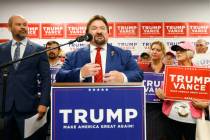Republican’s talk about taxing groceries crossed party line
Memo to Assembly Minority Leader Pete Goicoechea: Harriet Trudell would like to wring your neck.
When Goicoechea recently suggested a tax on food might be used to help fill the belly of Nevada's multibillion-dollar budget shortfall, the Republican was lauded for his candor in some circles and pistol-whipped in others. He said on Nevada Newsmakers, "I believe that we should have had a 2 percent sales tax on food on the ballot for this fall." He later said he wasn't proposing the tax, just citing a possible source of revenue in a fiscal crisis.
Setting aside the immense hypocrisy of a legislator from Nevada's low-taxed Big Gold country ever uttering a peep about alternative forms of revenue generation, Goicoechea struck a nerve that crossed party lines, but for different reasons.
Staunch fiscal conservatives bashed the White Pine County rancher for having the audacity to actually say the word "tax" in public.
Nevada progressives, meanwhile, groaned at the inherent insensitivity and lack of historical perspective of the legislator's rhetoric.
For her part, Trudell just wanted to punch Goicoechea in the nose.
"I saw it the other day and I just saw red," she says. "They can't possibly get such a thing on. I'd stroke out right there at the Legislature."
The 78-year-old Democratic Party stalwart and her fellow liberal foot soldiers fought throughout the '70s to rid the state of a long list of insults to the working class. The battle began during Gov. Mike O'Callaghan's administration thanks to the efforts of a fledgling group of idealists who flew under the banner of the Consumers League of Nevada. A few of the indefatigable souls associated with the Consumers League: Muriel Stevens, Kermit Waters, Herman and Patricia van Betten, David Canter, and future U.S. Sen. Richard Bryan.
From meat prices to milk quality, rip-off auto repairs to slippery wedding chapels, beginning in October 1971 the Consumers League represented working Nevadans at a time when the slightest attempt at consumer protection was ridiculed as anti-capitalist.
The Consumers League's price comparisons between grocery stores in poor and middle-class neighborhoods helped drive home the point. The sales tax on food hurt the poor and elderly on fixed incomes most.
"There was contempt if you couldn't earn your own way," Trudell recalls. "There was no mercy for people who could not keep up. And their children were incidental."
Sound familiar?
"It was so overwhelming, the issues that were facing people," former Consumers League president Patricia van Betten says. "The concept of justice was a really important issue for the people who were involved as volunteers."
When Republican Robert List won the 1978 gubernatorial race, he made a point of addressing the food sales tax issue in his first State of the State speech in 1979.
"I support the repeal of the sales tax on food," List said. "I urge the Legislature to repeal the portion of the tax which you can legally remove, and to authorize a vote of the people in June, to coincide with municipal elections, to determine if that portion of the sales tax on groceries which the people approved by ballot should be removed. I support its repeal by the people. There is little doubt in my mind of the outcome.
"This action will help each and every resident of Nevada, but it particularly will assist those living on low or fixed incomes, such as many of our state's elderly."
The vote was overwhelming. The undeniable will of the people rang the sales tax on food out of existence. Three decades ago, partisans put their politics aside and did the right thing.
What a quaint notion.
It's something today's so-called leaders should consider before playing partisan politics.
John L. Smith's column appears Sunday, Tuesday, Wednesday and Friday. E-mail him at Smith@reviewjournal.com or call 702-383-0295. He also blogs at lvrj.com/blogs/smith.












